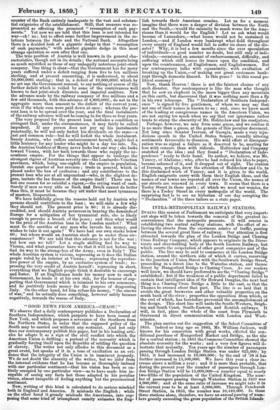"GOOD NEWS FROM AMERICA—CHAOS ! "
WE observe that a daily contemporary publishes a Declaration of Southern Independence, which purports to have been issued at New York, and which proposes a severance of the Southern from the Northern States, in order that the supposed policy of the South may be carried out without any restraint. And not only does our contemporary publish this paper' but in his leading arti- cles he adopts it as a sign of the civil conflict into which the American Union is drifting; a portent of the necessity which is gradually forcing itself upon the Republic of settling the question of slavery. The writer not only alludes to this document as a great event, but speaks of it in a tone of exultation as an evi- dence that the integrity of the Union is in imminent jeopardy. We do not doubt the sincerity of the writer, but we infer from the internal evidence that he has become so thoroughly imbued with one particular sentiment—that his vision has been so en- tirely occupied by one particular view—as to have made him in- capable of seeing any facts but those adapted to his peculiar vision, almost incapable of feeling anything but the preconceived sentiment.
Now, writing of this kind is calculated to do serious mischief both in England and America. It misleads the English ; while on the other hand it grossly misleads the Americans, into sup- posing that some kind of triumphant enmity animates the Eng-
lish towards their American cousins. Let us for a moment imagine that there were a danger of division between the North and the South,—would the calamity be much worse for the Ame- ricans than it would for the English ? Let us ask what would become of Lancashire,—what losses would not be sustained in London,—and if London were bankrupt what field throughout every county of England would fail to suffer its share of the dis- aster? Why, it is but a few months since the over speculation of individuals—a good number no doubt, but still only of indi- viduals,—oocasioned an amount of embarrassment, difficulty, and suffering which still leaves its traces upon the condition, and upon the countenances, of Englishmen, and Englishwomen. But our contemporary talks with equanimity, with exultation of breaking up the Union,—of making our great customers bank- rupt through domestic discord. Is this peace ? Is this sound po- litical economy ? Now, thank Heaven ! there is not the faintest chance of any such disaster. Our contemporary is like the man who thought that he saw an elephant in the moon bigger than any mountain on this earth, but discovered that it was nothing more than a fly in his own telescope. The "Declaration of Southern Independ- ence " is signed by five gentlemen, of whom we may say that not one of their names is known to us ; and, since we know most of the leading or conspicuous names in the American Union, we are not saying too much when we say that our ignorance rather tends to stamp the obscurity of Mr. Holitzclaw and his coadjutors. Perhaps, however, we may form some guess, and we confess it is no more than a guess, at the genesis of this peculiar document. Not long since Senator Iverson, of Georgia, made a very inju- dicious speech in the United States Senate, roundly uttering sentiments favourable to disunion. His wild effort at disorgani- zation was as signal a failure as it deserved to be, meeting far less with censure than with ridicule. Holitzolaw and Company snatched at the idea ; and they found a "Declaration of Inde- pendence " ready to their hand. Its author, we believe, was Mr. Yancey, of Alabama ; who after he had reduced his idea to paper, became ashamed of it, and it dropped out of sight. The oration of Iverson, perhaps, drew the attention of Holitzelaw and Co. to this disclaimed work of Yancey, and it is given to the world. English emigrants carry with them their English ideas, and. the names of our towns are repeated all over the Union, the names of our streets are renewed in every town. It seems that there is a Tooley Street in those parts ; at which we need not wonder, for there is a Tooley Street in every metropolis of the world. The surprising fact is to see an historian of our day accepting the " Declaration " of the three tailors as a state paper.


































 Previous page
Previous page